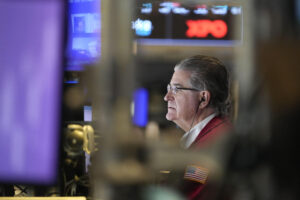US Stocks Slide as Tariff Uncertainty Dominates the Markets
On a cautious trading day, U.S. stocks faced a slight decline on Tuesday as market participants reacted to the latest tariff policies proposed by President Donald Trump. Investors had their eyes glued to the unfolding economic scenario, particularly with the focus shifting to inflation and the highly anticipated testimony of Federal Reserve Chair Jerome Powell.
By mid-morning, the Dow Jones Industrial Average (DJI) was down approximately 0.2%, while the S&P 500 (GSPC) and the tech-heavy Nasdaq Composite (IXIC) both slipped about 0.1%. This downturn follows a relatively positive day on Wall Street, underlining the markets’ volatility and the prevailing uncertainty surrounding trade policies.
Trade War Tensions and Tariffs
The primary source of concern stemmed from President Trump’s announcement of a new set of tariffs, including a 25% import tax on steel and aluminum, effective from March 12. This new policy raises alarms for key trading partners like Canada and Mexico, creating a ripple effect across various sectors. Investors are left wondering how the prospective trade war might impact corporate earnings and, more critically, inflation rates.
Gold prices reflected this uncertainty, reaching a fresh all-time high while attempting to find safety amid the turmoil before taking a step back on Tuesday. The push towards gold as a hedging strategy exemplifies investor sentiment as they brace for potential market disruptions.
Anticipation of Powell’s Testimony
As the day progressed, all eyes shifted towards Powell’s scheduled testimony before Congress. Market analysts were keen to hear any insights he might have concerning the implications of new tariffs on inflation and interest rates. Powell signaled a cautious approach, affirming that the Federal Reserve is not in any rush to modify interest rates despite the ongoing economic complexities. He acknowledged that inflation remains somewhat elevated, stressing the importance of a measured response to pricing pressures.
In the world of finance, the upcoming Consumer Price Index (CPI) report is drawing significant attention. Set to be released on Wednesday, this report will offer a deeper insight into ongoing inflationary trends, which could further shape Federal Reserve policy.
Corporate Earnings and Market Reactions
On the earnings front, Coca-Cola (KO) reported robust figures, outperforming estimates amid heightened soda demand, even as it eyes the ramifications of rising input costs due to tariffs. The company’s CFO addressed concerns about agricultural commodities and the impact of rising aluminum prices on packaging, assuring investors of a well-planned strategy that includes leveraging alternative packaging options.
Meanwhile, Shopify (SHOP) saw its stock rebound after initial losses, recovering ground due to better-than-expected holiday sales despite a downbeat earnings forecast. Such company-level responses to macroeconomic dynamics highlight the resilience of certain sectors amid broader market turbulence.
Broader Market Implications
Elon Musk’s failed bid for AI giant OpenAI stirred discussions on Wall Street, raising questions about investment trends in artificial intelligence and technology. This attempt to acquire OpenAI at a valuation well below market expectations drew attention, particularly as tech companies like Meta (formerly Facebook) announced layoffs to pivot towards AI expertise.
In addition to corporate maneuvers, the oil market also showed signs of resilience, climbing in response to reports that U.S. sanctions are beginning to curtail Russian oil production and sales. Brent crude futures approached $77 a barrel, reflecting the interplay between geopolitical factors and market responses.
The unfolding scenario encapsulates a wealth of opportunities and risks for investors as they navigate through tariff uncertainties, inflation insights, and corporate performance—all essential elements in shaping the financial landscape.
As you stay informed with Extreme Investor Network, consider diversifying your strategy, leveraging insights and analytics that empower your investment decisions. Remember, informed investing is the key to thriving in market volatility.

